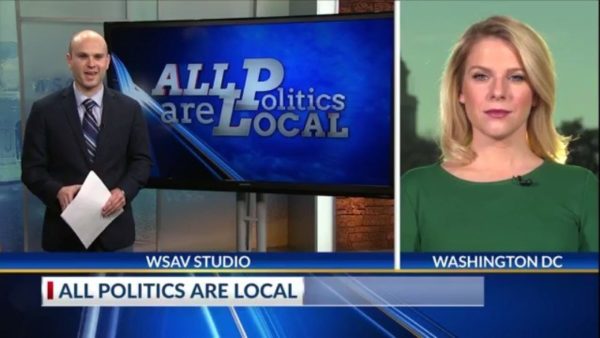It’s election campaign time. You’re busy in the kitchen, or still in bed waking up, when you hear the rattle of the letterbox and post slip through.
You might breathe a sigh of relief the doorbell didn’t go, with a campaigner waiting to ask who you’ll be voting for next month.
But when you do collect the bundle of post, how long will it take you to realise that there is a political advert masquerading as a local newspaper?
“Initially I thought it was a real local paper,” says Andy, who lives in south London. “But I had only looked at it briefly before leaving the house.”
He received something called the Daily Press from Labour candidate Rosena Allin-Khan, which featured the headline: “LOCAL POLL: 90% SUPPORT REMAIN.”
Andy told Sky News: “I even mentioned the survey it reported on to a couple of people, but did say I wondered if maybe it was an election ad but that it didn’t look like one.
“Only when I got home and looked closer did I doubt it more, but it took longer to find the Labour Party logo.”
Anne, who lives in Loughborough, also recently got what she called a “pretend newspaper” – this time from the Conservatives.
“I think it’s a blatant attempt to trick people into thinking it’s from an independent source,” she told Sky News.
“I literally had to get out the magnifying glass to find the text confirming it was issued on behalf of the Tories.
“Any political party should be proud to shout about its policies and communicate them openly.”
It is worth mentioning these newspaper-style election adverts are not new.
But it is a Liberal Democrat one that has sparked fresh debate over whether they should be banned to stop voters being misled.
Toby Granville, editorial director of the Newsquest Media Group that publishes many local papers across the UK, lambasted Jo Swinson’s party for distributing the “Mid Hampshire Gazette”.
He accused them of passing themselves off as a real local newspaper, the Basingstoke Gazette.
“This is outrageous,” he tweeted on Tuesday. “If this isn’t pulled I’ll advise all Newsquest editors not to publish any campaign news for your party in build-up to #GE2019.”
The Society of Editors, which represents top executives at news brands all over the country, is calling for reform.
“It is ironic how it is often politicians who complain about fake news but then set out to at least blur the lines for readers – and in this case voters – by packaging their partial messages to ape independent newspapers,” executive director Ian Murray said.
“If political parties were genuine in their desire, often expressed, to both remove the effects of fake news and disinformation as well as support existing regional and local media, they would take steps to ensure their political freesheets look markedly different to real newspapers.”
He is calling for more enforceable rules to be drawn up to stop parties “aping” existing publications or appearing to be truly independent newspapers, also suggesting they “clearly state which party is funding a publication in large, bold typeface rather than hiding such information away in an attempt to deceive”.
A Welsh voter who received a “Cardiff Central News” election ad told Sky News it looked like a mix of several regional papers.
The voter, who did not want to be named, said they honestly believed it was their local free paper – and only realised its true source when someone pointed out the small print confirming it was distributed by a political party.
“My concern is that it may falsely influence older people round here who tend to take the local papers pretty literally,” they added.
The Lib Dems have defended their “Mid Hampshire Gazette” advert, saying it was “not distributed anywhere near” the actual Basingstoke Gazette’s circulation area.
“We remain committed to communicating with people, and tabloid newspapers has been one way of doing this employed by all political parties for decades,” a party spokesperson told Sky News.
The Electoral Commission confirmed current rules dictate parties must use “imprints” on all print campaign material – including the name and address of the printer and promoter “so that voters can be clear about the source of the campaign material”.
Labour and the Conservatives did not respond to a request for comment.
The other candidates standing in Tooting are Glyn Goodwin, Green; Olly Glover, Lib Dem; Kerry Briscoe, Conservatives; Adam Shakir, Brexit Party; Roz Hubley, Social Democratic Party.








